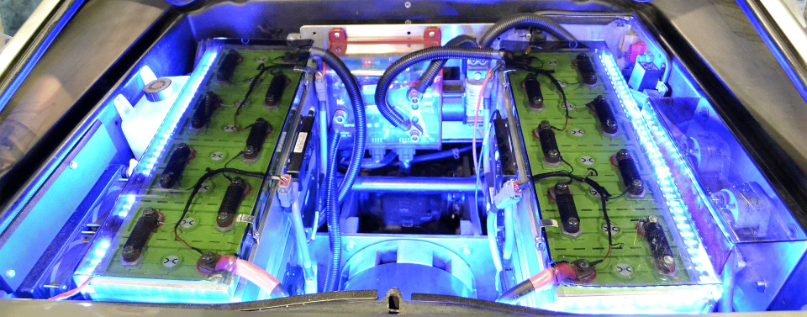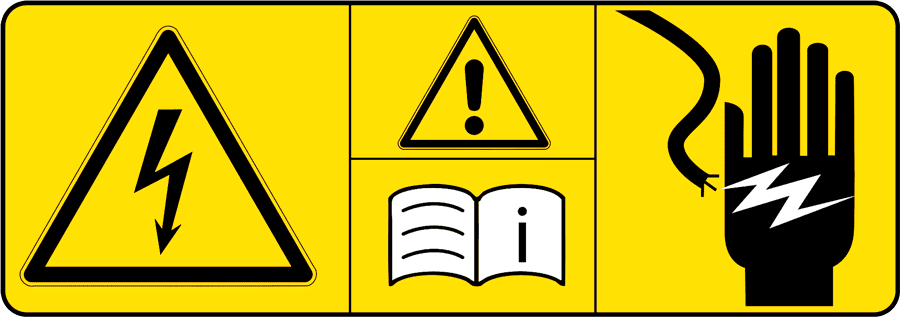(ev) high voltage training in battery technology
TCS doesn’t just provide support: we do it for you!
(ev) high voltage training: safe work in battery production
With regard to occupational safety in battery production, a distinction must be made between two basic hazards: The chemical health hazards in cell production (regulated in DGUV Information 203-082) and the electrical hazards (basic to be considered according to DGUV Regulation 3).
The good news is that these two threats rarely need to be fully addressed at the same point of production. This is due to the nature of electrochemical cells: Individual cells mostly have voltages of less than 4 V, which no longer represents any electrical hazard. When the individual cells go into module production, again, potentially harmful chemicals will no longer be used.
However, this does not mean that cell chemistry no longer plays a role in battery production; in the final effect, it is the cause of electrical problems and can again play a greater role in the event of a fire.
Therefore, in the electrotechnical safety of battery production, high-voltage training in accordance with DGUV I 209-093 (formerly DGUV I 200-005 / BGI 8686) is required for working on high-voltage systems, but adapted to the specifics of battery technology. For this we are active as experts for our customers. We offer both (ev) high voltage training for battery technology and (ev) high voltage training for vehicle technology.
(ev) high voltage training for SHV for battery technology: work according to work instructions
For electrical work, at least one electrical specialist for defined tasks (ESfdt) with a high-voltage specialization is required; this is also referred to as a specialist for high-voltage systems (formerly specialist for high-voltage systems (FfHV)) (high-voltage training III). The basic qualification required for this includes (ev) high voltage training of 20, 48 or 100 hours, depending on the target group. We offer these training courses according to DGUV I 209-093 (formerly DGUV I 200-005 / BGI 8686) Level 2E i.V.m. DGUV Regulation 3 for all target groups, also for battery technology; from electrical lay persons (100 hours according to DGUV Information 209-093 Level 2E, Entry A) to electrical engineers (24 hours according to DGUV Information 209-093 Level 2E, Entry C). The SHV may perform repetitive, defined activities on the HV (ev) system under full contact protection, either completely independently or according to a clear work instruction (i.e., checklist), depending on the entry-level qualification and the employer’s assessment. We will be happy to advise you on the details individually according to your needs. The work on the HV (ev) system must not be continued as soon as an unforeseen circumstance occurs or if it is necessary to deviate from the options of the work instruction. The risk of accidentally contacting live parts above the permissible touch voltage of 60 V (DC) also precludes the SHV or ES from working without the additional qualification Live Line Work (LLW). Since battery cells cannot be switched off according to nature, a work and qualification concept is particularly important when using employees; we would be happy to advise you on this.
Safety-relevant voltage range
Live line work is not allowed, not even on batteries, not even with a (ev) high voltage training level 2E. Live line work is defined as live work above the permissible touch voltage. In the case of the high-voltage battery, the limit of the permissible contact voltage according to ECE R 100 is 30 V AC and 60 V DC. According to § 8 of DGUV Regulation 3, live line work (LLW) may only be performed in exceptional cases and must be carefully carried out by specially qualified electrical specialists who have been certified as having no health risks by occupational health screening G 25 in accordance with DGUV Regulation 2, DGUV Rule 103-011 Item 3.2.1. The absolute necessity of the live line work, together with the reasons why it is not possible to work in a de-energized state, must be demonstrated, and the work instructions must be given in writing and clearly documented. Live line work according to § 8 DGUV regulation 3 is to be distinguished from working near active parts according to § 7 DGUV regulation 3!
(ev) high voltage training battery technology – course offer
Mandatory annual instruction in the sense of ArbschG & DGUV V 1, according to DGUV Information 209-093
Seminar type: As a webinar or in-house at your location
Target group: instructed persons (FuP), specialist high voltage (SHV), electrical specialists for high voltage (ES HV)
Scope: Four teaching units
Price list: Download (click)
Seminar documents, performance review and certificates included
Offered teaching languages: German, English, Slovak, Norwegian (for other languages with experienced interpreters).
Qualification according to DGUV Information 209-093 Level 1E in connection with the special features of battery technology
(ev) high voltage battery training II)
Type of seminar: In-house at your location, if necessary as webinar (online training)
Target group: Employees who perform non-electrotechnical work as well as work in an electrotechnical context (such as entering battery production, e.g. by logisticians).
Scope: Four teaching units
Price list: Download (click)
Seminar documents, performance review and certificates included
Offered teaching languages: German, English, Slovak, Norwegian (for other languages with experienced interpreters).
Qualification according to DGUV Information 209-093 Level 2E, Entry A in connection with the special features of battery technology
(ev) high voltage training III a)
Type of seminar: In-house at your location, partly as webinar (online training) if necessary
Target group: Employees with vocational training and work in a motor vehicle context without previous electrical engineering knowledge.
Scope: 10 days in two weeks.
Minimum number of participants: 4
Price list: Download (click)
Seminar materials, examination and certificates included
Offered teaching languages: German, English, Slovak, Norwegian (for other languages with experienced interpreters).
Qualification according to DGUV Information 209-093 Level 2E Entry B in connection with the special features of battery technology
(ev) high voltage battery training III b)
Type of seminar: In-house at your location, if necessary in parts as webinar (online training)
Target group: Employees with vocational training and work in a motor vehicle context with previous electrical engineering knowledge.
Scope: Five days in one week.
Minimum number of participants: 4
Price list: Download (click)
Seminar materials, examination and certificates included
Offered teaching languages: German, English, Slovak, Norwegian (for other languages with experienced interpreters).
Qualification according to DGUV Information 209-093 Level 2E Entry C in connection with the special features of battery technology
(ev) high voltage battery training III c)
Type of seminar: In-house at your location, if necessary in parts as webinar (online training)
Target group: Employees with electrotechnical vocational training and work experience.
Scope: three days.
Minimum number of participants: 4
Price list: Download (click)
Seminar materials, examination and certificates included
Offered teaching languages: German, English, Slovak, Norwegian (for other languages with experienced interpreters).
Qualification according to DGUV Information 209-093 Level 3E in connection with the special features of battery technology
Type of seminar: In-house at your location, if necessary in parts as webinar
Target group: Employees with existing qualification according to DGUV I 209-093 level 2E or according to the old qualification DGUV I 200-005 level 2b or 2c
Scope: Three days
Minimum number of participants: 4
Price list: Download (click)
Seminar documents and certificates included
Offered teaching languages: German, English, Slovak, Norwegian (for other languages with experienced interpreters).
Qualification according to DGUV Information 209-093 Level 2E Entry C and Level 3E in connection with the special features of battery technology
Type of seminar: In-house at your location, if necessary in parts as webinar
Target group: Employees with electrical engineering qualifications (e.g. electrical engineers, electrical specialists in other fields)
Scope: five days
Minimum number of participants: 4
Price list: Download (click)
Seminar documents and certificates included
Offered teaching languages: German, English, Slovak, Norwegian (for other languages with experienced interpreters).

Qualified instructed person in battery technology
All employees who work in development, production or repair in the field of high-voltage battery technology in the non-electrical sector require high-voltage battery technology training to be appointed as an instructed person (iP) in accordance with level 1E of DGUV Information 209-093, DGUV Regulation 3 (high-voltage training I or II). The instruction is intended to make employees aware of the handling and dangers of high-voltage systems so that they can work safely on site. Employees should be aware of possible sources of danger and situations, but also be familiar with the markings of the high-voltage components. Regardless of whether it is the external supplier who “only” delivers a pallet of screws, service providers for the KUKA robots on site or the cleaners who mop up after hours; they must all be trained to the extent of at least four hours of instruction.

Qualified person for high-voltage systems (SHV) in battery technology
For all work on the non-intrinsically safe battery (such as assembly), must be qualified at least to specialist high voltage (ev) high voltage (ev) according to DGUV Information 209-093 Level 2E, DGUV Regulation 3 (high voltage training III). The focus of the instruction intention is on the safe execution of the assigned electrotechnical activities on the high-voltage vehicle for oneself and others. Not only functional information is imparted, but also the basic understanding of electrotechnical terminology, mode of operation and hazards. Depending on the previous training that is always to be taken into account, this training must cover a scope of 3 to 10 days. However, please also note the distinction from live line work in accordance with DGUV Information 209-093 Level 3E.
